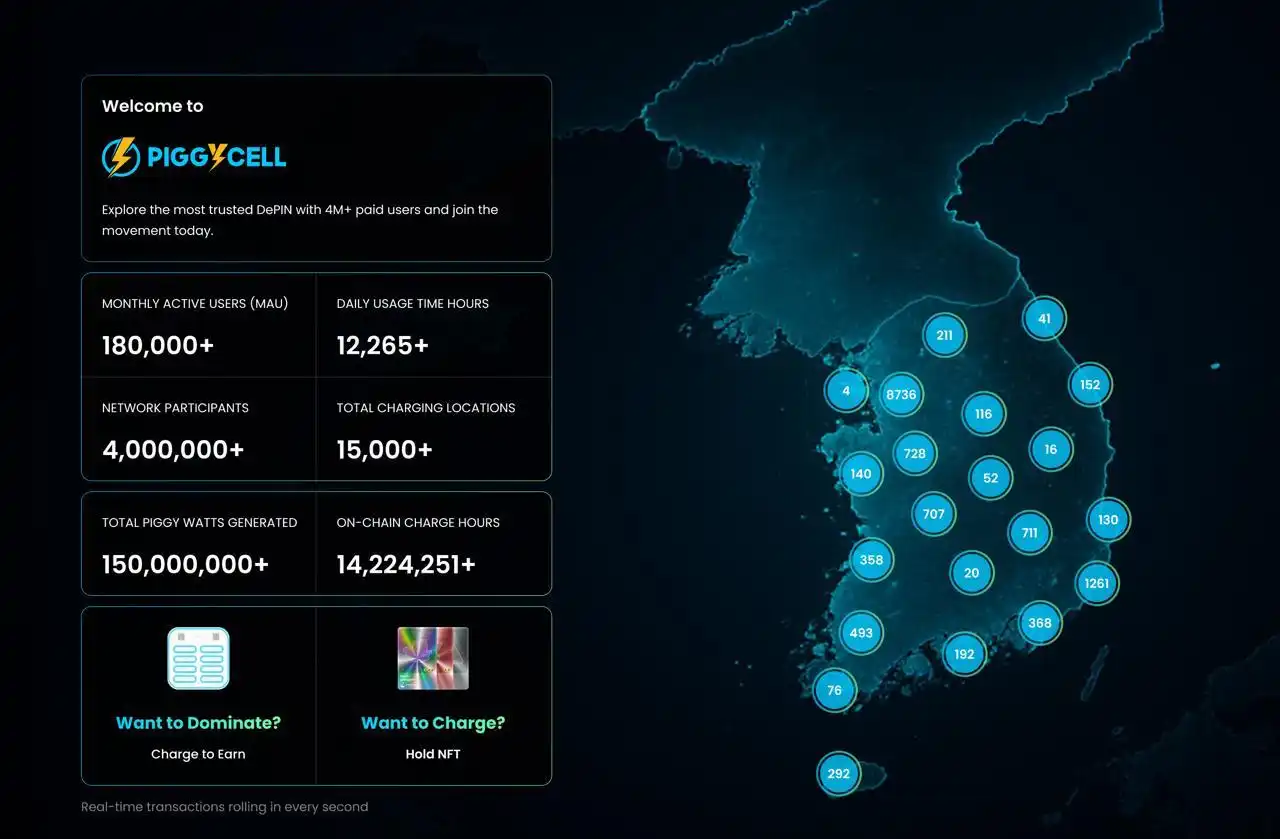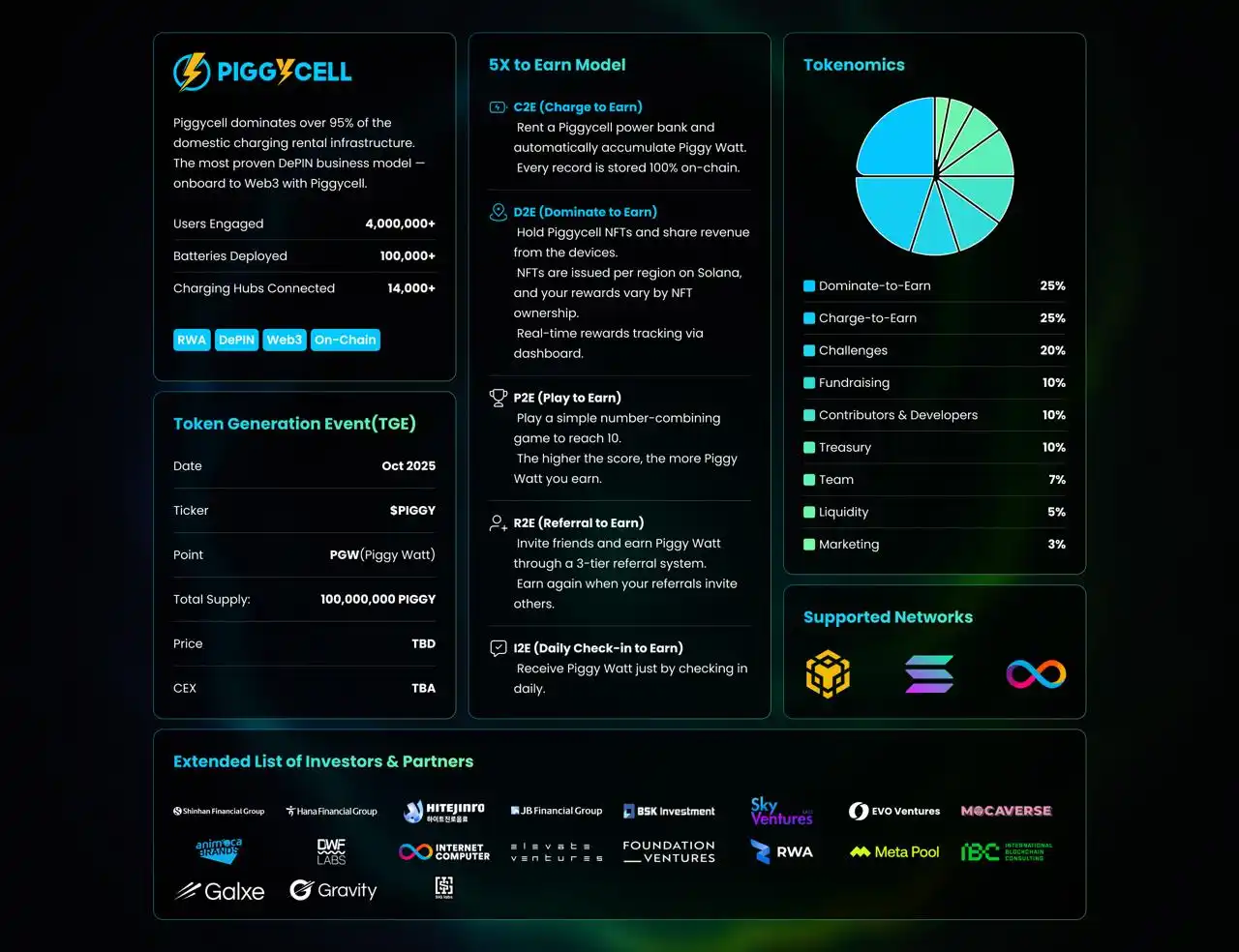South Korea's leading shared power bank service, Piggycell: Driving Global Expansion through Blockchain
1. Piggycell is the leading company in the South Korean shared power bank market, with a 95% market share, over 14,000 stations, and more than 4 million users. 2. Piggycell utilizes the DePIN + RWA model to transform charging devices into on-chain assets, enabling automatic yield distribution. The core gameplay includes Charge-to-Earn, Occupy-to-Earn, and Challenge-to-Earn. 3. Piggycell has secured a $10 million seed funding round from investors including Animoca Brands, ICP Hubs, and DWF Labs, and receive
Source: Piggycell
South Korea's Leading Shared Power Bank Provider Piggycell: Driving Global Expansion with Blockchain
In South Korea, when it comes to borrowing a power bank on the go, most people turn to Piggycell. This well-established company has captured a 95% market share, with 14,000+ locations and over 4 million users, nearly monopolizing the South Korean shared charging market. Recently, Piggycell has also successfully attracted a new $11 million investment round, which includes participation from large South Korean corporations and banks.

Bringing a Mature Offline Network onto the Chain
Utilizing the DePIN + RWA model, Piggycell has transformed mobile power banks, shared charging stations, and other charging devices into measurable, settleable, and tradable on-chain assets.
Users do not need to understand complex blockchain processes; they simply rent a power bank as usual, and the backend automatically handles profit distribution.
Three Core Gameplay Mechanics that are Intuitive and Easy to Understand:
Charge-to-Earn: Earn token rewards through charging;
Occupy-to-Earn: Hold device NFTs and receive a share based on actual usage;
Challenge-to-Earn: Complete tasks to receive additional incentives.
This model integrates ownership, profit-sharing, and community participation, allowing users to not only be one-time consumers but also directly engage in real cash flow.
Backed by Strong Capital and Data
Piggycell is not concept-driven but is an upgraded solution built on real business and cash flow:
Has received a $10 million seed round investment, with investors including Animoca Brands, ICP Hubs, and DWF Labs;
Operates over 100,000 high-quality batteries and 14,000+ offline service stations;
Annual revenue has been stably above $20 million, validating the sustainability of the business model;
In its latest funding round, received a total of $11 million in support from large South Korean corporations and banks.
Key Sprint Towards TGE
Piggycell has set a clear target to launch its TGE in Q4 of 2025 and plans to debut on a tier-one exchange in mid-October. Currently, the final round of community task activities before the TGE is taking place on the Galxe platform, providing a pre-participation opportunity for global users.
One-sentence Summary
Piggycell combines South Korea's leading shared charging network with blockchain technology, integrating real users and real-world scenarios onto the chain, and sharing the benefits with every participant.
With this step, Piggycell's story is transitioning from Korea to the global stage.

Disclaimer: The content of this article solely reflects the author's opinion and does not represent the platform in any capacity. This article is not intended to serve as a reference for making investment decisions.
You may also like
BC-Gold-Silver
As Shiba Inu & AAVE Prices Shift, ZKP’s $1.7B Goal & Built-First Model Grab Investor Attention

Whitehall mistake reveals scheme to impose new charges on outraged gambling sector
Luffa Partners with GOTCAR to Bridge Web3 and Mobility
